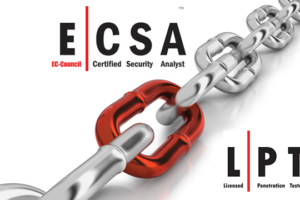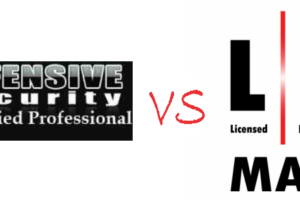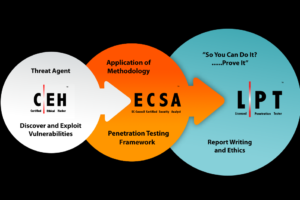Cybersecurity is a fast-growing and intriguing career, but it’s not an easy one to enter. People who succeed in information security jobs are detail-oriented, have strong communication skills, are fast learners, and have extensive computer knowledge.
Before launching a cybersecurity career, you need extensive knowledge of core technologies, including IT infrastructure, operational systems, software engineering, and interface.
Certifications can be the most cost-effective way to boost your credentials no matter where you are in your career. Some cybersecurity certifications are fairly straightforward, but others can provide you with a real challenge.
We ranked the seven hardest cybersecurity certifications based on required experience, exam duration, exam requirements, and prerequisites needed to earn the certificate as well as the pay it can offer.
The 7 hardest cybersecurity certifications:
1. Offensive Security Certified Professional (OSCP)
Who needs this certificate? The OSCP is a rigorous, real-world test for penetration testers who want to advance their careers. It does not, however, meet US Department of Defense 8750 baseline certification requirements. So if you intend to work for the federal government, take the Certified Ethical Hacker (CEH) exam.
- Experience Recommended – To sit for the OSCP, you should have extensive cybersecurity experience. Certainly, you need knowledge of a programming language like Python as well as basic Linux skills. You also need to know about TCP/IP networking.
- Exam Duration – 24 hours
- Exam Requirements – Hack into five computers in 23.45 hours. Good luck.
- Recommended Coursework – Penetration Testing with Kali Linux training course or ECSA Training.
- Recertification – None
- Average Pay – $66,985
Total Score: 25/25
The reason for our rating: White hat hackers widely regard the OCSP as the most difficult cybersecurity certification exam.
2. Certified Information Systems Security Professional (CISSP)
Who needs this certificate? Penetration testers and cybersecurity professionals who want to hold the gold standard of excellence for cybersecurity certification. Currently, 79,617 people in the US hold this certificate.
- Experience Required – Five years of IT experience. A bachelor’s degree or one of an array of courses can count for one year of experience.
- Exam Duration – 3 hours. The CISSP Exam has 100-150 multiple choice and “advanced innovative” questions. The passing grade is 700 out of 1000 points.
- Exam Requirements – up to 150 questions.
- Required Coursework – You must show skills in two of the 8domains in the (ISC)2 CISSP Common Body of Knowledge (CBK)
- Recertification – every three years unless you have earned 120 CPEs over the three-year cycle.
- Average Pay – $86,298
Total Score: 24/25
The reason for our rating: Although the OCSP exam is the most difficult due to its short time frame and hands-on approach, the CISSP is regarded as the apex of cybersecurity certifications.
3. Licensed Penetration Tester (Master)
Who needs this certificate? Hackers who want to advance in their careers beyond the CEH can take the LPT (master).
- Experience Recommended – Two years of experience in penetration testing.
- Exam Duration – 18 hours.
- Exam Requirements – Completed all 3 levels of the exam, including at least 1 challenge successfully from each level plus earn a minimum score of 5 out of 9 challenges.
- Required Coursework – To take this exam, you need to have completed the Certified Ethical Hacker and the EC-Council Certified Security Analyst (ECSA) programs.
- Recertification – every two years.
- Average Pay – $81,060
Total Score: 23/25
The reason for our rating: Like the OCSP, this certification is a continuation of the Certified Ethical Hacker (CEH) training. It’s long, rigorous, and requires extensive knowledge.
4. Certified Ethical Hacker (CEH)
Who needs this certificate? Intermediate-level hackers who need to prove their skills to hiring managers.
- Experience Recommended – Two years of information security experience.
- Exam Duration – 4 hours.
- Exam Requirements – 125 questions.
- Required Coursework – To take this exam, you need to have completed the Certified Ethical Hacker program.
- Recertification – Holders must participate in the EC-Council Continuing Education (ECE) Program.
- Average Pay – $77,487
Total Score: 22/25
The reason for our rating: Although the exam is challenging, it does not require the level of advanced knowledge that others do.
5. CompTIA Advanced Security Practitioner (CASP+)
Who needs this certificate? Experienced IT professionals who want to move deeper into enterprise-level security management.
- Experience Recommended – A minimum of ten years of experience in IT administration, including at least five years of hands-on technical security experience.
- Exam Duration – 165 minutes.
- Exam Requirements – 90 questions.
- Required Coursework – It logically follows CompTIA Security+.
- Recertification – Earn 75 CEU credits over three years.
- Average Pay – $83,741
Total Score: 22/25
The reason for our rating: A tough certificate, CASP+ can open new opportunities for cybersecurity professionals. Still, the test itself doesn’t require the same intense rigor as others.
6. Computer Hacking Forensics Investigator (CHFI)
Who needs this certificate? Those who love the defensive and investigatory work of cybersecurity should pursue this certificate.
- Experience Recommended – Two years of security experience in infosec.
- Exam Duration – 4 hours.
- Exam Requirements – 150 questions.
- Required Coursework – You must have completed the associated training from the EC-Council or complete an eligibility form.
- Recertification – every three years. CHFI certificate holders must participate in the EC-Council Continuing Education (ECE) Program.
- Average Pay – $78,518
Total Score: 22/25
The reason for our rating: It’s a difficult exam that can be especially challenging for those with limited exposure to forensics, but it is a shorter and less intense undertaking than other certification exams.
7. Security+
Who needs this certificate? Anyone moving from general IT to cybersecurity can benefit from this certificate.
- Experience Required – Two years of experience in IT is generally recommended.
- Exam Duration – 90 minutes.
- Exam Requirements – 100 questions.
- Required Coursework – This is an exam for people who are entering the profession.
- Recertification – To recertify, holders must earn 50 qualifying Continuing Education Units (CEUs) every three years.
- Average Pay – $62,851
Total Score: 21/25
The reason for our rating: This is the first certificate most cybersecurity professionals obtain upon entering the career field.








